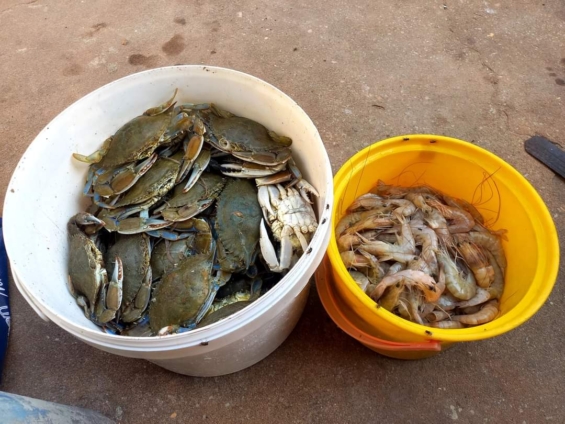The periodic opening and closing of the Azizadzi floodgates have inadvertently led to an unexpected bumper harvest of crabs and shrimps in the lagoons of the Keta and Anloga districts.
Local fishermen and residents have reported an increased abundance of these aquatic species, resulting in a significant economic boost for the communities.
The Azizadzi floodgates, strategically designed to manage water levels in the lagoons and prevent flooding in the surrounding areas, have unintentionally created ideal conditions for the proliferation of crabs and shrimps.
The fluctuation of water levels, coupled with the regular opening and closing of the floodgates, has allowed for the easy entry and exit of these aquatic species.

Fishermen in the area have observed a substantial increase in their daily catches, attributing the phenomenon to the changing water dynamics caused by the Azizadzi floodgates.
The unexpected windfall has provided a welcome relief for the local fishing communities, which have been grappling with various challenges in recent times.
"I have been a fisherman in this area for over two decades, and I have never seen such a prolific harvest of crabs and shrimps. It's like nature has rewarded us for the challenges we face," said Kofi Mensah, a local fisherman from Keta.
In an interview with MCE for Keta, Emmanuel Gemegah, the eased availability of crabs and shrimps has not only impacted the local economy but has also created opportunities for the expansion of businesses in the seafood industry.
Local markets are witnessing a surge in the supply of these prized catches, leading to lower prices and increased accessibility for residents.

However, concerns have been raised about the sustainability of this unexpected boon. Environmentalists and fisheries experts are closely monitoring the situation, urging the local authorities to conduct thorough assessments to ensure that the increased harvest does not lead to overfishing or negatively impact the delicate ecological balance of the lagoons.
Emmanuel Gemegah noted that the Keta and Anloga districts have become a focal point for researchers studying the interplay between water management systems and aquatic ecosystems.
The unintentional consequences of the Azizadzi floodgates serve as a reminder of the intricate relationship between human activities and the natural world, prompting a reevaluation of the environmental impact assessments for similar projects in the future.
As the communities in Keta and Anloga enjoy the unexpected abundance of crabs and shrimps, discussions are ongoing about the long-term management of the Azizadzi floodgates and how to balance the needs of flood control with the preservation of the region's rich aquatic biodiversity.
Latest Stories
-
Ghana signs €87.7m debt relief agreement with France
26 minutes -
Kumasi killings: Police snap checks intensify
49 minutes -
Almost a third of people in Gaza not eating for days, UN food programme warns
1 hour -
Afenyo-Markin offers apology to Dr. Ayensu-Danquah over “strange reasons” remark
1 hour -
How Dr. Ayensu-Danquah cleverly evaded Afenyo-Markin at her vetting
2 hours -
Dr. Ayensu-Danquah defends professorship, stating 15 years of teaching surgery
4 hours -
Access Bank honoured with two prestigious awards at 2025 HESS Awards
4 hours -
A/R: Aspiring nurse killed in Denase gun attack
5 hours -
Oti Region to get university within my tenure – Mahama reaffirms pledge
5 hours -
Kofi Bentil calls for abolition of regional ministers
6 hours -
Daughter killed in father’s arson attack over sex denial
6 hours -
GIHOC to undergo restructuring amidst crippling inefficiency and GH¢427m debt
6 hours -
NPA Scandal: Four suspects remain in custody after failing to meet bail conditions
7 hours -
NPP to open 2028 flagbearer nominations on July 29
8 hours -
Sam George to open Pan-African AI Summit 2025
8 hours

